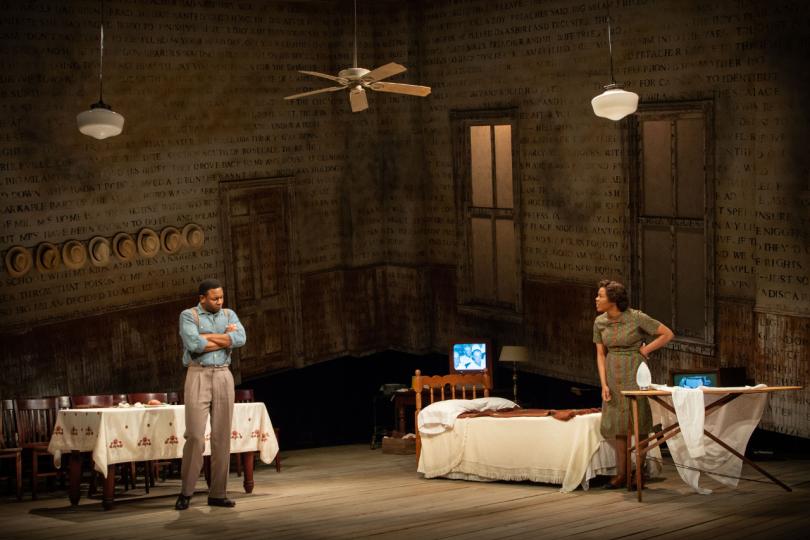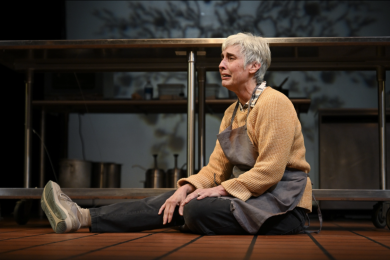Indignity and Grace

Penumbra’s production of “benevolence” (lowercase “b” intended) continues Ifa Bayeza’s trilogy about the murder of Emmett Till. The first, “The Ballad of Emmett Till,” was staged at Penumbra in 2014 to critical acclaim. The current work is a beautifully wrought, profoundly sad play about some of people who were involved in, or whose lives were destroyed by, the murder.
Till was the hazel-eyed 14 year old African-American child from Chicago who was visiting his relatives down South in 1955 when he made the fatal error – fatal, that is, in the moral cesspool that was Jim Crow Mississippi -- of not averting his eyes when he paid a white woman behind the counter of a drugstore for his purchase of bubble-gum. That woman was Carolyn Bryant. Till did nothing more than smile and walk out of the store. (Some accounts have him whistling when he exited the store but Till was known to have a childhood habit of whistling when he was nervous.) A few nights later, he was taken from his uncle’s home in the middle of the night, thrown in the back of a truck, and taken to a spot where he was beaten, mutilated and shot by two white supremacists, Roy Bryant (Carolyn’s husband) and J. W. Milam (Roy’s half-brother).
When the two men were put on trial for the murder, they were acquitted by an all-white jury. On the witness stand, Carolyn fabricated a sensationalist account in which she portrayed the 14-year-old child as a fearsome, would-be rapist; Bryant’s testimony incorporated grotesque racist stereotypes of African American male sexuality. Only months after the trial, Bryant and Milam confessed to having murdered Till in a Life Magazineinterview, but they were never punished for their actions; and, in fact, they were well-paid for the interview.
There is no way to watch this play except through a lens tainted with the blood of Tamar Rice, Trayvon Martin, Jamar Clark, Antwon Rose, Philando Castile, and far too many others. Clearly, we still live in a time when people, some as young or even younger than Till, can be killed for little more than being African-American, with most of those murders going unpunished. Bayeza does not belabor the relevance; she trusts the audience to draw the obvious connections.
The first half of “benevolence” trains its focus on Carolyn Bryant (Sara Marsh), the wife of one of Till’s murderers. Bayeza takes on the aesthetic challenge of portraying a woman who not only caused a murder but helped to free the murderers. This is not to say that Bryant is presented sympathetically, but that Bayeza invests her character with emotional and psychological complexity. In both of the Bryants’ psyches, gross racism is mixed up with narcissism; Roy (Peter Christian-Hanson) who works as a trucker for his half-brother is bitter with envy and preoccupied with “getting some respect in this town”. Carolyn, a former beauty queen, is self-concerned and entitled: she complains that she is “bored out of her skull”, complains that she has to work, and complains at turns that she is too hot or too cold. She resents being trapped in a loveless marriage with a husband who bullies and sometimes manhandles her, but she seems equally resentful that Roy doesn’t make a good living. The Bryants are small, mean people who revel in mocking and humiliating each other.
The play explores the question of whether Carolyn Bryant’s actions were in some part the product of a cruel marriage (the real Carolyn cited “habitual cruel and inhuman treatment” as grounds for seeking a divorce from Roy, almost 20 years later) and, perhaps, of oppressive Southern sexism generally. There may be something to that, but it is hard to ignore that there were many thousands of other Southern women who suffered in similar ways without instigating horrific racist murders. Bayeza’s stagecraft involves narrowing and then suddenly broadening contexts. Near the end of Act One, she gives Carolyn a spellbinding monologue in which she describes having nightmares in the aftermath of the murder. The speech is so mesmerizing that we are almost lulled into empathizing with the character. Then it hits us. That Carolyn (like Macbeth) should be denied peaceful sleep seems like (a very small) justice.
In one of the best scenes of the play, a reporter visits Carolyn many years later. (Marsh is absolutely riveting in this scene.) It soon becomes clear that she is incapable of remorse or even of grasping the magnitude of her actions. She equivocates. She tries to change the subject. She denies. She says she’s too cold. She wants tea. For someone so narcissistic, how can there be transformation? Bayeza’s depiction of Bryant recalls Hannah Arendt’s famous argument that great evil can appear often banal. (A journalist writing a book about the Till murder reported that Carolyn in 2007 finally admitted that she had made up her allegations about what Emmett Till had said and done. In July 2018, the US Department of Justice announced that they were re-opening the investigation of Emmett Till’s lynching.https://www.aclu.org/blog/racial-justice/race-and-criminal-justice/more-60-years-after-his-brutal-murder-emmett-till).
Bayeza strikes the right balance in portraying the Bryants’ racism as simultaneously ideologically-driven and primal. Director Talvin Wilks doesn’t allow us to distance ourselves from the Bryants’ shocking cruelty as Roy Bryant (Peter Christian Hansen) aggressively directs racist slurs to members of the audience. Roy and Carolyn are at their most appalling after Roy returns to the house covered in blood after having mutilated and murdered the child. Carolyn tells us: “Roy came in, kissed me wet on the lips, his mouth showin’ me the tip of his tongue in the corner: We killed a [n--] tonight”, whereupon the two ferociously grope one another, their eyes aglow with triumphalism. It is a testament to the power of their performances that Christian-Hansen and Marsh, both reasonably attractive actors, appear grotesque as they enact this post-murder sexual encounter. There are similar transformations scattered throughout the act. During the testimony scene, Marsh’s face congeals into a hard, plastic mask that appears almost inhuman. All four actors in the play give outstanding performances.
The play is structured to reflect the reality of segregation in the Jim Crow South. The second act focuses on Clinton and Beulah Melton, young working class African-American parents of four children, who live in the tiny cotton town of Glendora four miles from Money. When we first meet them, they too are having marital troubles. Clinton (Darrick Mosley) has fathered another woman’s child. Beulah (a searing Dame-Jasmine Hughes) refuses to let him back in her bed. Nevertheless, the two remain devoted to one another and to their family life. Both the Meltons work night and day to make enough money to support their children. Without depicting the Meltons as saints, Bayeza evokes the couple’s essential decency, as they struggle to create a separate private world of family, mutual respect and love in the midst of a landscape of ceaseless violent threats.
And then, in a stroke, their lives crumble. Clinton works part-time as a service station attendant. One night, Elmer Otis Kimbell, a friend of Milam’s, drives up to station in Milam’s vehicle and asks for a fill-up. When Clinton finishes filling up the car, Kimbell rages about having only asked for a dollar’s worth of gas; he then goes home, fetches his gun, and returns to the station to shoot Clinton dead. Just a few weeks later, Beulah Melton was driving with two of her kids when she was run off the bridge, killing her (her children survived).
In the play, Bayeza has Kimbell come to the gas station on the night of Emmett Till’s murder and Clinton catch sight of Till’s dead, mutilated body in the back of the truck. Kimbell taunts him: this is what we do to “smart [N---s].” Returning home to Beulah he is so traumatized by the incident he can barely speak. But he tells Beulah he wants to serve as a witness. “We outnumber them” he tells Bea. “If we stand up, we got a chance to change.” Bea, the realist in this family, disagrees: “We ain’t got a chance in hell. They got guns, Melton, they got the law, they got the power.”
We see how regardless of what they choose to do or not to do, the Meltons are denied the agency simply to go on living their lives. Nor do they have the economic freedom to leave their home. The Meltons are strapped in a way inconceivable to people like the Bryants. I do not think Bayaza is drawing parallels between the Bryants and the Meltons as working-class people. She portrays a vast gulf between the privilege enjoyed by the Bryants and the terrorized lives of the Meltons. Nor does Carolyn and Beulah’s common gender reveal some sort of parity. Both women may have less power than the men in their lives. But Carolyn Bryant had choices; Beulah Melton had none.
The ‘benevolence’ of the title does not, I think, equate with forgiveness. The word is uttered by one of the Melton’s surviving children (Hughes again, here radiant with defiance). She is recollecting the story her parents kept repeating, of their first meeting, at a dance in 1949. She says she likes to imagine that somewhere her parents are together, still dancing. The benevolence is the grace that the character herself exudes in her reclamation of her parents’ vision of a life grounded in love and fundamental decency, even in the wasteland.Her speech, like the play as a whole, is a fierce refusal of erasure.
I could be wrong about this or any number of things. That is part of Bayeza’s genius; her artful layering of multiple perspectives and of overlapping voices generate enough ambiguity to invite a plurality of interpretations. The richly symbolic, dreamlike style she employs - what Wilks calls poetic realism – enables Bayeza to convey nuances that elude exposition. There is something almost surreal about the moral depravity of the Bryants; Bayeza brilliantly captures its essence. Bayeza described her earlier play about Till as a “jazz integration of past and present, the living and the dead.” In ‘benevolence’ too we also find sudden shifts in time and setting. There is also a good deal of shape-shifting on the part of the actors. This can be challenging at times: she has four actors play 12 different parts. There were moments where I wasn’t sure who was speaking.
The program describes ‘benevolence’ as “an imagined story evoked from a real one” and as “an interpolation of archives, oral histories and observations.” As someone who has grown wary about the way that some historical dramas sometimes make truth claims (directly or indirectly) about invented or revisionist narratives, I can confidently say that is not what is going on in ‘benevolence’. Beyeza is not blurring the line between fact and fiction. Rather she is interweaving, without contradicting, the factual record with an imaginative narrative that explores the psychological motivations and emotional life of the figures she portrays. Conjecture is utilized in the service of fact. Throughout Bayeza and Wilks take pains to emphasize the power of documentation to withstand and to outlive false report. The documentation theme informs Maruti Evans’ set design in which the yellow walls of the Bryant’s home are overwritten with excerpts from the typed transcripts of Emmett Till’s trial. Four small period tv’s are placed along the apron of the stage. Their screens unobtrusively shift from photos of the Bryant store, of the all-white jury, of the bridge which Beulah Merton was run off of, and of the river in which she drowned while returning, again and again, to the iconic image of Emmett Till in a felt hat, gently smiling, a few months before he was killed.
The overall effect of this supremely crafted production is to remind us of the mountains of moral debts that still have to be paid. Trilogies invite cyclical re-stagings; we should revisit these plays about Emmett Till not once, but again and again. For now, it’s essential to see ‘benevolence’, but one should not go expecting disburdening or catharsis. For if there is one thing that Bayeza’s play, beautifully, gracefully, teaches us, it is that there can be no way forward that does not reach back through the past. We are not free to forget.




